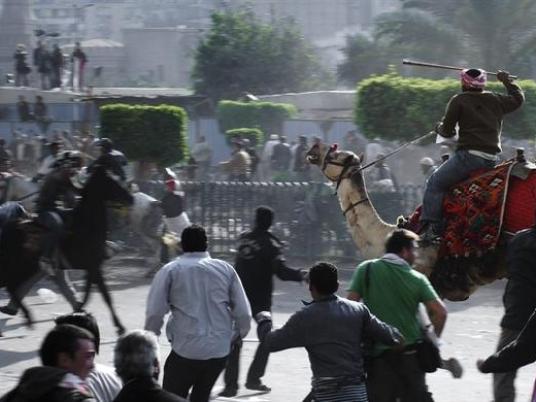
Prominent media personalities are confronting a backlash after speaking out against Egypt’s judiciary following the acquittal of defendants in the infamous Battle of the Camel trial.
To date, 1,164 judges have filed complaints against hosts of daily TV talk shows accusing them of insulting the judiciary, as outraged media personalities criticized the verdict of one of the most contentious trials of the January 2011 uprising.
All 24 defendants in the Battle of the Camel case were acquitted of killing protesters on 2 and 3 February last year during the uprising that ousted President Hosni Mubarak, with the ruling stating that witness testimonies were based on hearsay and grudges against the defendants over parliamentary elections.
Justice Minister Ahmed Mekky appointed Chancellor Tharwat Hammad as an investigating judge to look into the complaints, and interrogations are underway.
Renowned ONTV talk show host Reem Maged was released Tuesday on LE500 bail pending investigation into accusations of insulting the judicial institution, judges and the judging panel of Mubarak’s trial.
In June 2012, Mubarak and former Interior Minister Habib al-Adly were sentenced to 25 years in prison for failing to prevent the deaths of protesters during the 25 January revolution.
In a statement published on her official Facebook page, Maged denied all accusations agaainst her and explained that the two episodes in question aired in August 2011, when Judge Ahmed Refaat, who led the judging panel for the Mubarak trial, imposed a publishing ban on the case.
Talk show hosts Hala Sarhan, Lobna Assal, Sherif Amer and Riham al-Sahly were also released after brief questioning, and Wael al-Ibrashy will be summoned for a second interrogation on Sunday.
Rights activists perceive these recent accusations as blatant violations of freedom of expression, and say that elevating state institutions above criticism contradicts the basic principles of democracy and accountability.
“This is a rift between two sides: one working on raising the ceiling of freedom of expression, and another aiming at limiting it,” says Emad Mubarak, director of the Association of Freedom of Thought and Expression.
Preventing media from criticizing court rulings threatens freedom of expression and violates citizens’ right to information, he argues.
“Citizens need to know what happens inside courtrooms. They need to understand why certain verdicts are issued in certain ways, and the media is the only channel for people to know. Silencing media figures … leads to more ambiguity and less accountability of the judiciary toward the law and the public,” he said.
The complaints were filed randomly against all talk show hosts, he added, which reflects the judiciary’s mounting anger against journalists.
Media and activists faced similar accusations of insulting the military when the Supreme Council of the Armed Forces ruled the country, which was viewed as an attempt to stifle criticism against authorities and longstanding institutions.
At the time, activists and media figures, including Maged, were interrogated by the military prosecution while others were sentenced by military courts for openly expressing critical views. In the most widely covered case, Blogger Maikel Nabil received a three-year prison sentence by a military court in March 2011 for writing an anti-army blog post. The sentence was later reduced to two years after an appeal before he was pardoned by the military.
Accusations of insulting the judiciary stem from a view that commenting on court rulings hinders judicial independence and shakes public trust in the judicial system. However, critics say this has no legal roots in Egypt’s Penal Code.
“Nothing in the Penal Code clearly states that criticizing judicial verdicts deserves to be legally penalized. It is just a tradition that it is not healthy to comment on the work of the judiciary,” Mubarak says, adding that in this context, the only way to oppose court rulings is via the Appeals Court.
Hoda Zakareya, professor of political psychology at Zagazig University, says that after revolutions, criticism intensifies against failing state institutions, which is a shock to members of these institutions who have traditionally operated in a less hostile atmosphere.
“Judges believe they are under threat after being heavily criticized by the public, and that their reputation as the guardians of justice is [being called into question],” Zakareya explains, dismissing the possibility of a widening rift between media and judges.
She does not see that these complaints will ever be taken to court or that any of these media figures will be imprisoned, she says, adding that this is merely a cautionary note from judges to the media.
Either way, Mubarak says, “This is a blatant crackdown on freedom of expression, and it sends worrying signals.”
This piece was originally published in Egypt Independent's weekly print edition.


